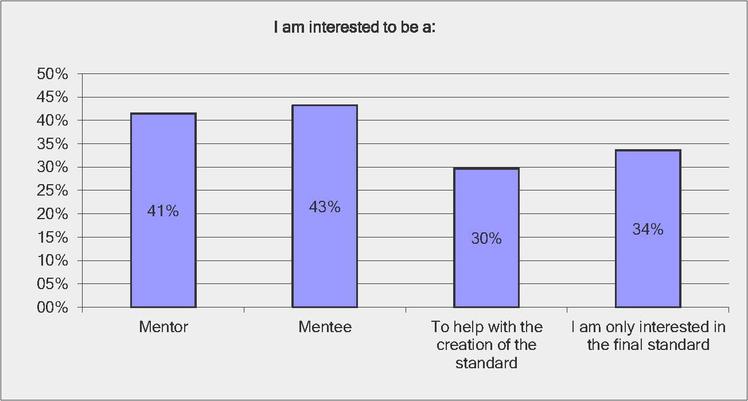Mentoring for Translators and Interpreters
SURVEY RESULTS - Analysis of the answers
PART IV: END OF THE SURVEY
This last part was accessible to all participants, even those having answered that they had never acted either as a mentor or as a mentee, and who were not interested in playing any of those roles in the future.
Question 52: Do you have any other comment to help with the creation of a Mentoring Standard?
60 persons answered this question in Part IV of the survey. 21 simply answered that they had no other comments. Many people wrote positive and encouraging comments, expressing their gratitude for this initiative. Since many ideas were expressed, sometimes with participants suggesting several ideas, we have simply listed all the useful comments here below, grouping them in sections.
Goals for mentoring
- How to find weaknesses that translators should strengthen
- Make sure translation skills are improved
- Help building connections for newcomers
- Help mentees build a sustainable career (work efficiently, good strategy, negotiation, business variations, etc.)
- Provide feedback on translation skills
- People should understand that it is important to do their job with excellence, on time and at a fair rate
Ways of mentoring
- A rigorous qualification and classification process for applicants or future mentees is needed to categorize them into groups of certain needs and certain capacity building requirements
- Mentors should encourage mentees to get a high-level translation qualification
- Mentors should have a proven track record, and be able to promote the career of their mentees, not just recycle blog post and generic advice
- Only members of recognized translators and interpreters associations should act as mentors
- Mentors and mentees should work in the same languages and specialisations
- Mentors in business matters should have enough experience
- Possibility to compare the newcomers’ translation with the one made by the mentor
Ethics
- Clear stand points needed on professional ethics
- Mentors should not exploit mentees (requiring fast deliveries, low rates, etc.)
- “Get out” clause for both parties
Compensation
- Mentoring should be financially compensated by the mentee or an association
- Create a performance-related payment scheme, when the mentee will share his/her earnings with the mentor
Expectations from the standard
- Give a realistic overview of the macroeconomic situation, globalisation and their effects on our profession
- Make the difference between mentoring during academic life and mentoring once being graduated
- Build the step between academic training and work as a successful freelance translator
- Build trust in the structures and the individuals involved
- Remove the grey, unknown areas of our profession, market
- Explain how the collaboration between the mentee and the mentor should work
- Should include usability/user experience knowledge
- Advice on training courses for mentees
- Implement mentors’ training and support (this could encourage people to mentor)
- Help build a community spirit
- Make the standard international
Various
- Take into consideration that the majority of translators and interpreters seem to be women
- Mentees should really be motivated and not participate in the program only to pass an exam or get some sort of points
Although the vast majority of the comments were positive and constructive, some negative comments were also made, such as:
- Do not encourage mentoring
- It’s stupid to teach competitors the ropes of the profession
- Please stop this initiative
- This concept is a total waste of time
Some people also left comments regarding the questionnaire itself – those will be taken into consideration for any future survey:
- For all the questions having “Other” as an option, it would be better to leave some space for comments
- The questionnaire didn’t take the fact into consideration that some participants are already part of a mentoring program
- No mention of “literary translation” in the questionnaire
- Some options were not available for some questions (Q10, Q11 for instance)
- Some options contain ambiguous terms (Q11, Q19, for instance)
- The option “N/A” (not applicable) should have been proposed in most questions
- The use of the e-mail in a mentoring program was not covered enough
- More questions should have allowed for multiple choices (Q22 for instance)
Question 53: If you would like to provide your email we will be able to notify you when the standard is ready
187 people provided us with their e-mail address. For confidentiality purposes, this data is not published with the current results.
Question 54: I am interested to be a…
(multiple choices)
Of the 229 participants having answered this question, 41% would like to be a mentor (95) and 43% would like to be a mentee (99). A large number of respondents would be interested in participating in the creation of a standard on mentoring (68), and a third of them are only interested in getting the final standard, once ready (77).

THE END
(< Back to Part 3: Mentee - Future or Continuing Mentoring)
Download the full analysis: Mentoring for Translators and Interpreters. Survey Results – Part 1: Analysis of the answers (PDF, 58 pages)
Access SURVEY RESULTS – Part 2: Conclusions
Download the resulting Mentoring Guidelines for Translators and Interpreters
